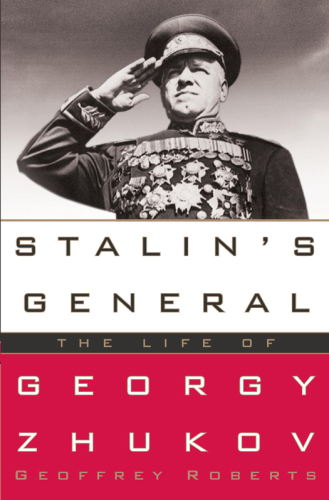
Stalin's General
The Life of Georgy Zhukov
کتاب های مرتبط
- اطلاعات
- نقد و بررسی
- دیدگاه کاربران
نقد و بررسی

May 1, 2012
A welcome new biography of the ruthless Red Army general who defeated the Nazis and then spent decades alternately disgraced and rehabilitated in Soviet Russia. Roberts (History/University College Cork; Stalin's Wars, 2007, etc.) relies less on his subject's self-glorifying memoirs and more on newly available archival material in Russia. Zhukov's relationship with Stalin emerges as a key, fascinating aspect to the story, as Zhukov, a rising cavalry commander in the rapidly modernizing Red Army, managed to escape being a victim of the army purges of 1937-38 and was then appointed on his first important mission for Stalin: to "conduct a purge" of the Japanese from the Mongolian-Manchurian border in 1939. The victory at Khalkhin-Gol was the Red Army's first real triumph, deflecting the Japanese from Russia and establishing Zhukov as a brilliant offensive field commander who kept his cool under fire and was not averse to administering draconian discipline to his own men. Stalin had neglected defensive preparation of the Motherland in favor of the counterattack, and he summoned Zhukov after the disastrous response to Hitler's Operation Barbarossa. From victory at Yel'nya to saving Leningrad and Moscow ("no surrender and no retreat; counterattack wherever and whenever possible") to Operation Bagration in Belorussia, Zhukov spared no number of Russia soldiers in his path to victory. Roberts spends a good deal of space on Zhukov's mysterious postwar dismissal to the provinces, due no doubt to his overweening confidence and "Bonapartist" self-aggrandizement, which grated on Stalin. He resurfaced supremely under Khrushchev and died a fitting hero in 1974. A solid, engaging life.
COPYRIGHT(2012) Kirkus Reviews, ALL RIGHTS RESERVED.

November 1, 2011
Marshal of the Soviet Union as of 1943 and hence a key player at the battles of Moscow, Stalingrad, and Kursk, Georgy Konstantinovich Zhukov was a leading general of World War II. In fact, some scholars argue that he effectively won the war for the Allies. Roberts has written extensively about the war in Russia and should deliver a thoroughgoing biography for lay reader and scholar alike.
Copyright 2011 Library Journal, LLC Used with permission.

June 1, 2012
The Soviet Union's most prominent WWII general, Georgy Zhukov, resolves into an important but flawed character in this portrait by an expert on Soviet military history. Roberts capitalizes on access to archives, including a prescient report from 1930 describing Zhukov as Wilful. Decisive . . . insufficiently tactful. These traits grated on fellow Soviet generals during the war and fueled a subsequent battle of memoirs, which furnish Roberts with another fruitful source for describing the manner of the man, personally and professionally. Apprenticed as a furrier, Zhukov was drafted into the czarist army. When it collapsed in 1917, he joined the Bolshevik Red Army and rose on the strength of his military competence and political reliability. His career became meteoric after defeating a Japanese force in 1939, but Roberts does not exempt Zhukov from criticism for cold indifference to the colossal casualties inherent to the battering-ram offensives he directed. Rounding his biography with the postwar Zhukov as a Soviet cold warrior and his private life as father of several children by different women, Roberts makes the only English-language Zhukov biography a WWII essential.(Reprinted with permission of Booklist, copyright 2012, American Library Association.)

























دیدگاه کاربران